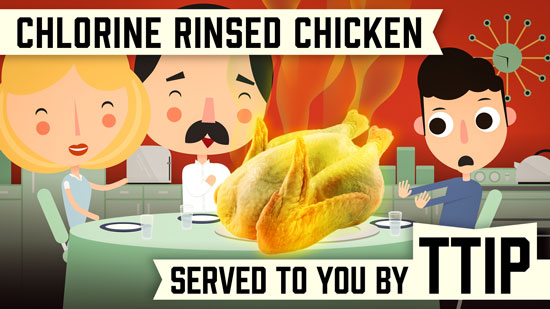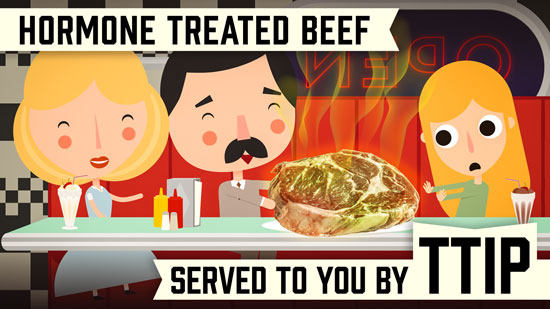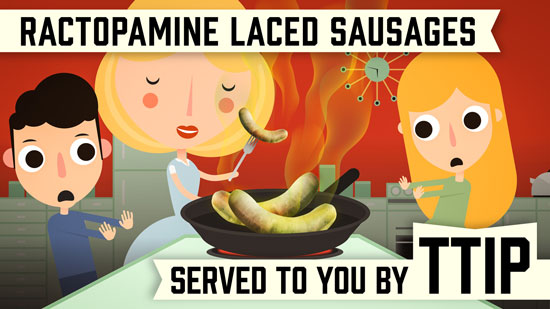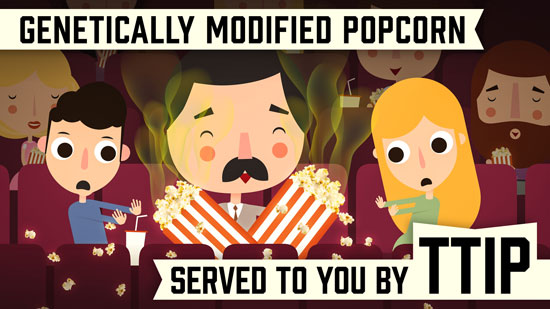This blog has been republished, with permission from Friends of the Earth Europe
The Transatlantic Trade and Investment Partnership, or TTIP, is a massive trade deal currently being negotiated between the EU and US, and could have major implications for our food standards if completed.
Laws that check our foods are safe or minimise the risk to people or the planet could be compromised if TTIP goes ahead. Europe's food production and many of our laws are often stricter than in the USA. Yet big business wants food products currently banned in the EU, but on sale in America, to automatically be allowed in Europe through TTIP.
Here are some of the foods produced in worrying ways we could see served up on European plates if TTIP is agreed.

Disinfectant meat washes
Chicken, turkey, pork and other meats are regularly washed or sprayed with disinfectants in the USA. These so-called 'pathogen reduction treatments', such as hyper chlorinated water and acid washes, are supposed to reduce harmful bacteria. But this could allow poor hygiene standards along the food chain to be hidden, with meat being disinfected only at the end before going on sale.
The EU has banned most of these practices since 1997 (only water rinsing is allowed). The EU prefers a preventative approach by ensuring high levels of hygiene at all stages of food production 'from farm to fork'.
The EU says it will not bow to US pressure in the trade talks to change its food safety standards on disinfectant rinses. But the European Commission has pushed for the authorisation of disinfectant rinses several times (only to be over-ruled by national governments), and it's advancing on approving Europe's first disinfectant wash for chicken, peroxyacetic acid.
'Pathogen reduction treatments' are bad for people. Instead of relying on disinfectants at the end of the production chain, good on-farm hygiene practices are a more effective way of protecting the public and farm workers from food bugs such as salmonella or campylobacter.

Hormone meat
Beef cows in the US are regularly given hormone drug implants to promote faster growth prior to slaughter. Use of hormones – including oestrogen, progesterone, testosterone and their synthetic versions – has been allowed in the US since the 1950s. The EU has banned the sale of hormone-treated beef in Europe since 1981, reaffirming this in 2003, due to public health concerns.
The EU recognises that "the use of hormones as growth promoters in cattle poses a health risk to consumers", after EU scientists found eating beef treated with hormones poses cancer risks, as well as endocrine, developmental, immunological, neurobiological effects, especially for children.
It is clear that hormone treated beef is being discussed in the TTIP negotiations. The US government, with the backing of big food businesses, launched an international trade dispute in 1996 to challenge the EU ban. The influential lobby group American Farm Bureau Federation, has said "continuing barriers to the export of U.S. beef... are major areas of interest" in the TTIP negotiations; while US Agriculture Secretary Tom Vilsack states "we are still going to have to have some conversation about the beef question."
Moreover, the EU is proposing to weaken inspection on imports of meats and foods, as well as to work towards accepting international standards which are often less stringent. Hormone beef and dairy products could therefore in the future start landing on our plates. Future bans on factory farm practices that could harm our health will be more difficult if TTIP is agreed.

Growth promotion drugs
Ractopamine is a drug given to pigs, cattle and turkeys as a growth promoter to build muscle. It's fed to 80% of pigs in the USA. But the EU banned its use in 1996, because its use "may be dangerous to consumers". The European Food Safety Authority has concluded that risks to human health cannot be ruled out: a classic example of putting public safety before the profits of agri-business, the so called precautionary principle.
Ractopamine is banned in over 160 countries worldwide, also because it can cruelly impact animals – causing stress, hyperactivity, trembling, broken limbs and sometimes death.
US agribusinesses say they "will continue to push negotiators to have the EU ban on ractopamine fed pork lifted under TTIP". Meanwhile, the United States government has targeted this ban as a barrier to trade that "appear[s] to lack scientific justification [and] pose[s] a major impediment to U.S. pork exports to the EU." As a result the US government has vowed to push the EU to implement weaker international standards that would allow certain levels of ractopamine-laced meat. In its TTIP position, the EU also supports moving towards adopting these weaker standards.

Genetically modified organisms
Where they are grown, genetically modified (GM) crops are linked to massive increases in herbicide use, the extension of mono-cultural farming practices, and increased costs all along the food production chain. The resulting social, environmental and economic impacts are severe.
European citizens – who have repeatedly voiced their objections to GM food – are currently protected, especially from imported foods or farmers' seeds that may be contaminated from GM crops that have not been approved for use in the EU. This is called the EU's 'zero tolerance' law. But in the US, genetically modified maize, soy and rapeseed are widely grown.
US negotiators and industry lobbyists have been pushing for weaker rules on GM imports in the US-EU trade talks, arguing that the 'zero tolerance' rule is a barrier to trade, and damages business for US exporters.
As a result, TTIP could, as with a similar new trade deal with Canada, allow low levels of GM foods and seeds to be imported into Europe that have not been authorised for sale in Europe or tested for their safety for humans and the environment. This would mean farmers and citizens would not know if the food or seeds they were buying contained GM ingredients – and Europeans could be eating unauthorised GM ingredients which have not been through any form of safety check.
More generally, the US and their big agribusinesses want to weaken all our laws on GM foods, including labelling. The American Soybean Association lobby group says: "TTIP must address the key EU biotech policies that are discriminating against US exports... First and foremost, the EU's mandatory traceability and labelling policies for products containing biotech ingredients must be replaced." The US government wants the EU to accept a faster authorisation process for GM crops and the removal of various 'trade barriers' which limit imports of GM crops to the EU.
TTIP must be stopped
It is clear, despite many reassurances from politicians, that TTIP is trading away our safeguards, the protection of our nature and local sustainable food and farming. The use of genetically modified crops and the growing production of factory farmed animals is not sustainable, raising big concerns about how TTIP might affect farm workers, our health and environment.
Friends of the Earth Europe, together with countless other organisations, is working towards a better food system that is kinder to the environment, puts people before profits, and ensures equitable access to safe and fairly produced food for all. We will not let TTIP open the doors to more factory farms and GM crops.
